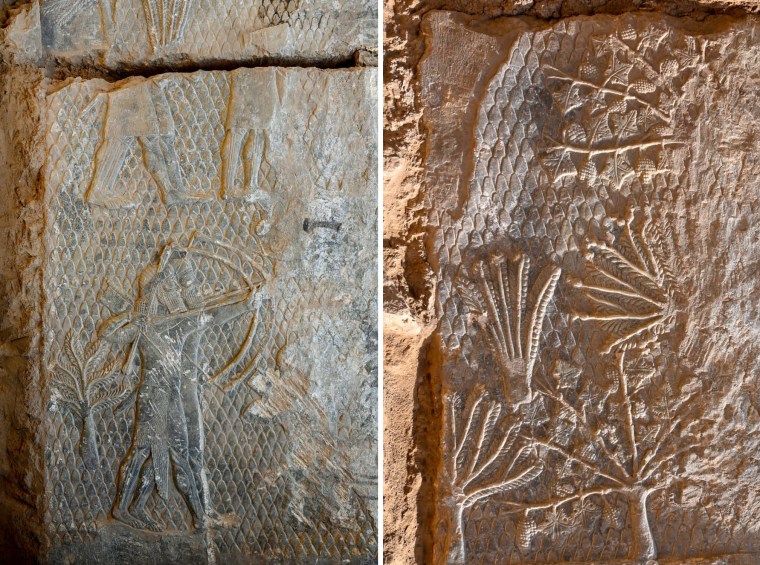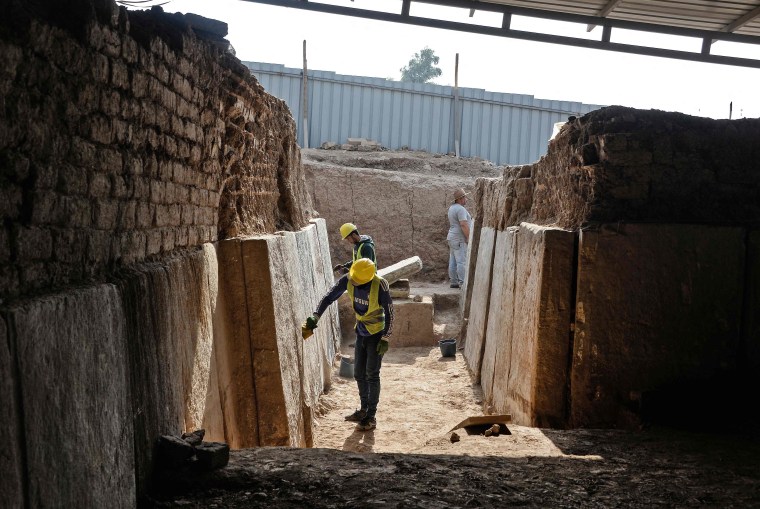Ancient rock carvings that are believed to be more than 2,700 years old have been unearthed by a team of archaeologists in Iraq's northern city of Mosul.
The marble slabs were found during restoration work on the Mashki Gate, an ancient monument that was partially destroyed by Islamic State militants when they captured the city in 2016.
The relief carvings show scenes of war from the rule of Assyrian kings, in the ancient city of Nineveh, the Iraqi State Board of Antiquities and Heritage said in a statement Wednesday.
The gray stone carvings date to the rule of King Sennacherib, in power from 705 to 681 B.C., the statement added.
Sennacherib was responsible for expanding Nineveh as the Assyrians’ imperial capital and largest city — siting on a major crossroads between the Mediterranean and the Iranian plateau — including the construction of a palace.
The discovery was made last week by an Iraqi team, alongside American experts from the University of Pennsylvania who are helping to lead the reconstruction effort.
The “discovery consisted of eight marble slabs carved with a relief representing scenes of Assyrian soldiers, in addition to palm trees, grapes, pomegranates and figs belonging to the palace of King Sennacherib,” Ali Shalgham, the director general of Iraq’s Investigations and Excavations Department, told NBC News on Thursday.
Fadel Mohammed Khodr, head of the Iraqi archaeological team, said in a statement that the carvings were likely taken from Sennacherib’s palace and used as construction material for the gate.
“We believe that these carvings were moved from the palace of Sennacherib and reused by the grandson of the king to renovate the gate of Mashki and to enlarge the guard room,” he added.

Iraq is home to some of the world’s most ancient cities, including Babylon. But years of conflict and instability have threatened the ruins of these cities and many cultural sites that were looted or damaged.
The project, which is being carried out in collaboration with Iraqi antiquities authorities, aims to turn the damaged monument into an educational center on Nineveh’s history.
Armed with sledgehammers, axes and drills, militants from the Islamic State group stormed museums in Iraq and destroyed priceless collections of sculptures and statues when the group took control of large areas of Iraq and Syria, in 2014.
Dozens of Assyrian, Akkadian, Babylonian, Persian and Roman artifacts held in Iraq’s museums were damaged or destroyed completely.
The group said it destroyed pre-Islamic works of art because it considered them to be idolatrous.

Members of ISIS also destroyed ancient sites in the 2,000-year-old Syrian desert city of Palmyra. In October 2015, militants blew up the Arch of Triumph — a major monument in the city.
Palmyra was one of the most important cultural centers of the ancient world, according to the cultural agency UNESCO, which has described it as the crossroads of several civilizations.
ISIS militants also smuggled the ancient artifacts out of the country and sold them on the black market. The U.S. has said this looting was a significant source of income for the group.
Following the invasion of Iraq in 2003 by U.S.-led troops, American Marines also damaged ruins from the ancient city of Babylon, after they built a helicopter pad on the site. A U.S. military officer later said he was willing to apologize for the damage.
